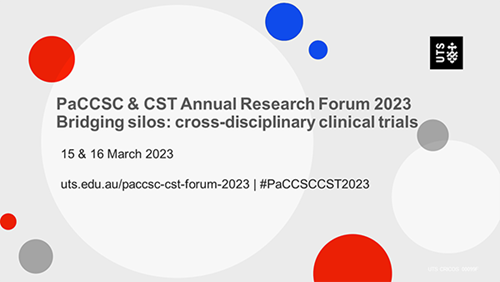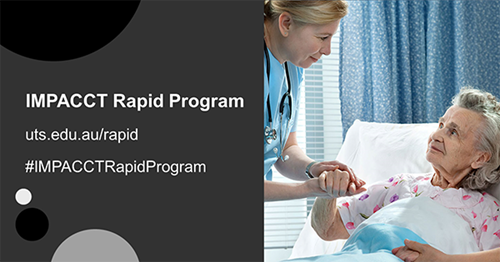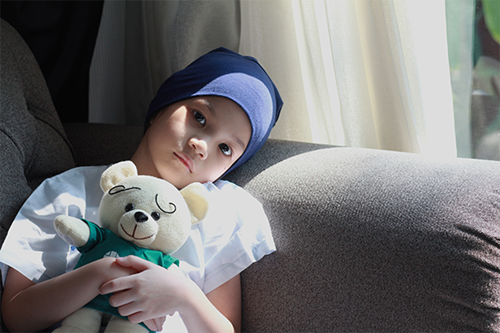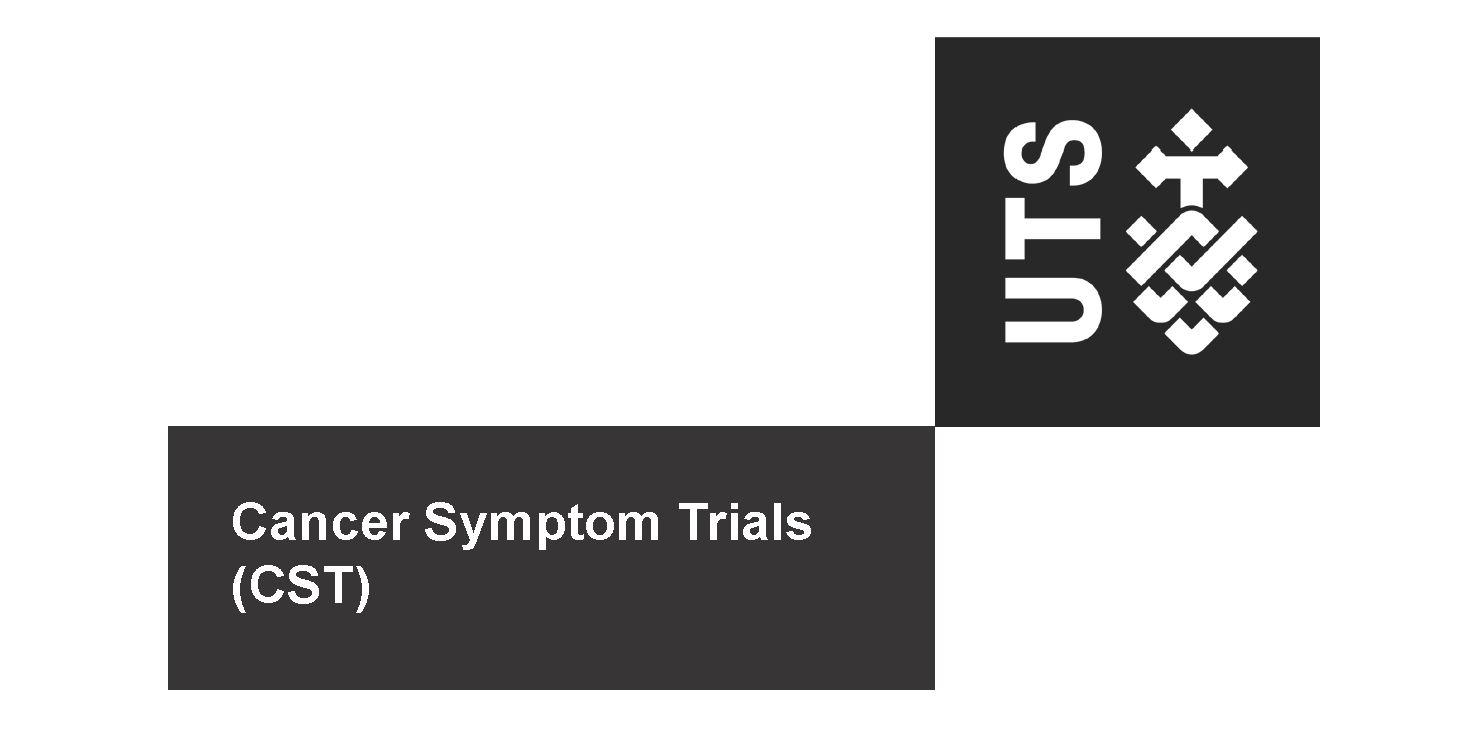- Category Marryalyan
- DATE 22 Feb 2023
Cancer Symptom Trials
February 2023
PaCCSC & CST Annual Research Forum 2023

The PaCCSC & CST Annual Research Forum is our principal annual event. Past forums have supported new study ideas, provided networking opportunities, and forged new collaborations. This year’s theme is Bridging Silos: cross-disciplinary clinical trials
We are focused on developing collaborative cross-disciplinary clinical trials to ensure better quality-of-life outcomes for people living with cancer and life-limiting illnesses.
Join us for the PaCCSC & CST Annual Research Forum in Sydney on 15 and 16 March 2023 to be part of the conversation. Find out more and register: uts.edu.au/paccsc-cst-forum-2023
We are pleased to announce our keynote speakers, Professor Maria Fallon, leader of the Edinburgh Palliative and Supportive Care Group at the University of Edinburgh, and Dr Camilla Zimmermann, Head of the Department of Supportive Care at the Princess Margaret Cancer Centre in Toronto.


Culturally and linguistically diverse (CALD) communities

We are undertaking a program of work to investigate the underrepresentation of culturally and linguistically diverse (CALD) communities in cancer clinical research in Australia.
We want to understand why people with cancer from culturally and linguistically diverse (CALD) communities do and don’t participate in cancer clinical research and whether they are given the opportunity to do so. These insights will help inform the design and implementation of inclusive and culturally appropriate cancer clinical trials.
The first project in this program of work is investigating healthcare professionals’ perspectives on the barriers and enablers of cancer clinical trial participation in the Australian Arabic-speaking community.
Find out more at uts.edu.au/cst/cald
IMPACCT Rapid Program

The IMPACCT Rapid Program is a collaborative international quality improvement program that studies the prospective use of medications and non-pharmacological interventions commonly used in palliative care and cancer symptom management.
Cancer-focused series
- Compression and related physical therapies for lymphoedema - series 25
- Diuretics for cancer-related lymphoedema - series 26
- Dressings for malignant cutaneous wounds - series 38
- Ketamine for cancer-related mucositis pain (paediatric) - series 42
If you are administering or using any of these medications or interventions, you can collect data for these series. To find out more and get involved, go to uts.edu.au/rapid.
Cancer symptom management priority setting - children and young adults

We are conducting a number of surveys to identify the most troubling symptoms or side effects of cancer and its treatments for children and young adults.
We are seeking participants who are:
- Health professionals
- Parents or caregivers
- Young adults living with, or after cancer, between 18 and 24 years of age (inclusive) OR adults who had a cancer diagnosis at or before the age of 24
- Adolescents living with or after cancer, between 11 and 17 years old (inclusive)
- Children living with or after cancer, under 10 years old
We will use the survey results to inform research and clinical trials that investigate ways to improve quality of life for children and young adults living with cancer. This is the first survey of its kind in Australia and New Zealand.
Find out more: uts.edu.au/research/impacct/cancer-symptom-trials/cst-projects
Consumer engagement
Our vision is to see every patient receiving the best care regardless of life circumstances, state of health or place of residence. We will only realise our vision with the invaluable contribution of a diverse and engaged Consumer Advisory Group (CAG) with lived experiences as patients or caregivers.
The IMPACCT Consumer Advisory Group (CAG) has been established to ensure that consumers are actively involved in shaping our research, supporting curricula development and providing general guidance on our strategic direction.
If you, or someone you know, has experience as a patient or caregiver in palliative care, aged care, chronic case or cancer supportive care, we’d love you to consider joining the CAG.
Find out how to become a consumer advisor: www.uts.edu.au/impacct/consumers.
CST clinical trials
Our clinical trials contribute to the knowledge base to inform best practice and ensure improved quality of life for people diagnosed with cancer. We investigate accessible, affordable, and appropriate medicines and therapies for people with cancer, including those living at home.
Go to the CST website to find out more about our clinical trials: www.uts.edu.au/cst

Join Australia's leading oncology community & make an impact
Become a COSA memberTwitter
@COSAoncology
Follow

COSAoncology 2 days ago
Thank you again to @RANZCRcollege for continuing your COSA Affiliated membership. RANZCR members are reminded to take advantage of the Affiliated discount for COSA memberships: bit.ly/3s5mOC6
Read More >
COSAoncology 4 days ago
Thanks to @ESSA_NEWS for renewing as a COSA Associated organisation and continuing to collaborate with COSA. A reminder that ESSA members are invited to take advantage of discounted COSA membership: bit.ly/3s5mOC6
Read More >
COSAoncology 11 days ago
Our Nutrition Group is hosting a Speed Networking Event on Fri 25 July for COSA members to get to know leading dietitians and researchers including Jane Stewart, Merran Findlay & Emily Jeffery. Connect with COSA members interested in nutrition and cancer! bit.ly/4nmK8GU
Read More >
COSAoncology 12 days ago
The Tom Reeve Award recognises a national leader who's made significant contributions to cancer care. The award will be presented at COSA-IPOS 2025 in Adelaide in November where the recipient is invited to deliver an address. Nominations closing 14 July. bit.ly/3hIXWcV
Read More >
COSAoncology 16 days ago
Have you renewed your COSA membership yet? You might like to renew before 30 June 2025: bit.ly/4cI0nc3
Read More >
COSAoncology 18 days ago
Our June member newsletter is out now. Check your inbox for the latest COSA news and updates including new resources, events, opportunities and peer-reviewed journal articles. Or log in and view it online anytime at bit.ly/4kRIRpp
Read More >
COSAoncology 19 days ago
COSA is the national oncology community bringing together multidisciplinary health professionals across all cancers to advance care and improve outcomes. More on member benefits here: bit.ly/3BwXvwL
Read More >
COSAoncology 26 days ago
If you selected automatic renewal, expect to see an email from COSA today. Please check your details in the email, and update your billing in your COSA account if needed. bit.ly/4cI0nc3
Read More >
COSAoncology 26 days ago
Check out what your membership supported COSA to achieve in the last year! Renew your membership to continue collaborating with COSA: bit.ly/4cI0nc3
Read More >
COSAoncology one month ago
COSA is a truly multidisciplinary community providing opportunities to connect with leaders in cancer healthcare, build networks and collaborations, access professional development, drive advocacy and facilitate research. Join or renew today: cosa.org.au
Read More >